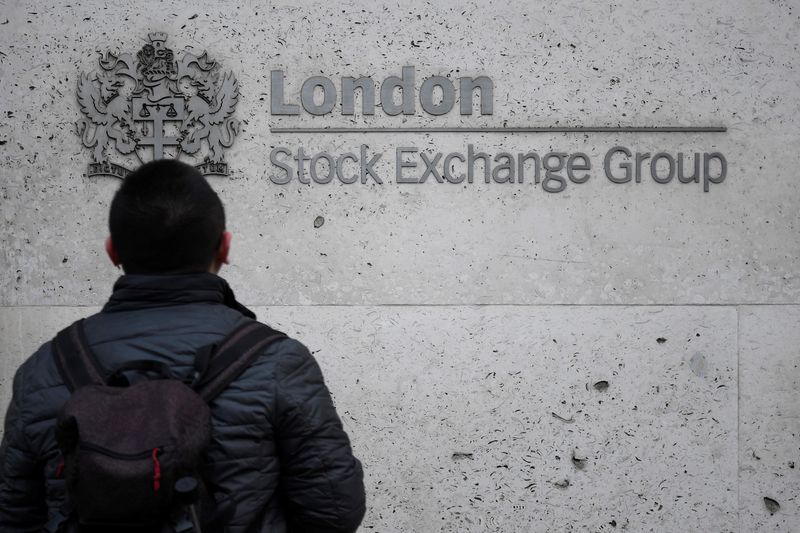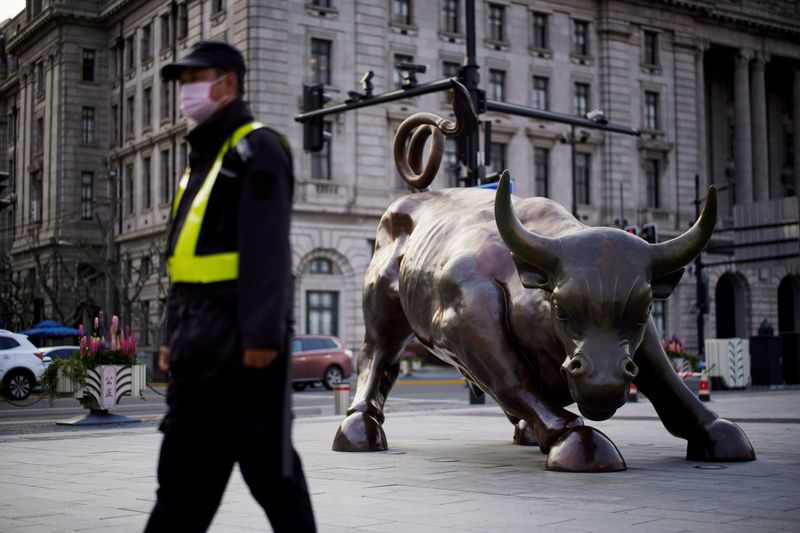By Ritvik Carvalho
LONDON (Reuters) - European shares recovered from their lowest levels in a month on Friday, as investors looked past a severe economic contraction in Germany and on to company earnings, while the euro reached its highest in more than two years, set for its best month in a decade.
The pan-European STOXX 600 (STOXX) rose 0.74%, though it was on course to end the month flat or lower. Technology shares (SX8P) propped up the rally, rising 1.6% after Wall Street's tech giants, Apple (O:AAPL), Amazon (O:AMZN) and Facebook (O:FB), reported forecast-beating results overnight.
MSCI's All Country World Index, which tracks shares across 49 countries, was up 0.1% on the day. (MIWD00000PUS)
"Germany’s (-10.1%) and France’s ( -13.8%) numbers have already shaped expectations around the magnitude of the 2Q slump in the aggregated eurozone economy," ING strategists said in a note to clients.
"Markets will therefore focus on assessing the slowdown in the Italian and Spanish economies, which were among the first and worst-hit countries in the pandemic."
They added the euro could hit $1.20 within the next few days. The single currency passed $1.19 on Friday. (EUR=EBS)
The dollar was set for its worst month in a decade against a basket of currencies, as abysmal economic data for the second quarter and rising global COVID-19 cases darkened the mood. The dollar index (=USD) dropped 0.1% to 92.699 (DXY) [FRX/]
Expectations the U.S. Federal Reserve will maintain its ultra-loose monetary policy for years also depressed the dollar.
U.S. gross domestic product plunged 32.9% in the second quarter, the biggest decline on record. Jobless claims rose last week, another sign the economic recovery has slowed.
Those figures overshadowed positive manufacturing data from China and Japan. China's official Purchasing Manager's Index data showed that factory activity grew in July for a fifth straight month and at a faster pace, defying expectations of a slowdown. Japan's industrial output snapped four months of declines in June.
Earlier in Asia, shares turned lower on Friday amid the economic data from the United States and rising global COVID-19 cases. After rising in early trade, MSCI's broadest index of Asian shares outside Japan (MIAPJ0000PUS) turned lower. It was last down 0.2%.
Australian shares (AXJO) were down 2.04% and Seoul's Kospi (KS11) ticked 0.64% lower. Japan's Nikkei (N225) dropped 2.82% as a stronger yen weighed on exporters.
Chinese blue chips (CSI300) were last up 0.35% in a session that swung repeatedly between gains and losses.
Futures continued to point to a higher open on Wall Street on Friday. Apple (O:AAPL), Amazon (O:AMZN), Facebook (O:FB) and Alphabet (O:GOOGL) reported quarterly earnings on the same day for the first time ever, all topping Wall Street estimates.
"All of them punched the lights out with respect to their earnings numbers," said National Australia Bank strategist Ray Attrill.
E-mini futures for the S&P 500 (ESc1) rose 0.3% and Nasdaq futures
U.S. stock markets, oil prices and the dollar slid on Thursday as the data underscored the economic impact of the coronavirus and U.S. President Donald Trump raised the possibility of delaying the November election.
On Wall Street, the Dow Jones Industrial Average (DJI) fell 0.85%, the S&P 500 (SPX) lost 0.38% and the Nasdaq Composite (IXIC) added 0.43%.
The dollar slumped 0.40% against the yen to 104.30
Crude oil recovered from an overnight slump, with global benchmark Brent crude (LCOc1) rising 1.1% to 43.44 a barrel. U.S. light crude added 1.25% to $40.42 per barrel.
Gold also turned higher, with spot gold
U.S. benchmark 10-year Treasury notes (US10YT=RR) yielded 0.5412%. The two-year yield (US2YT=RR) touched 0.1152% compared with a U.S. close of 0.121%.

Italian 10-year bond yields were set for their biggest monthly drop since January on Friday, boosted by the recovery fund agreed by the European Union last week.
